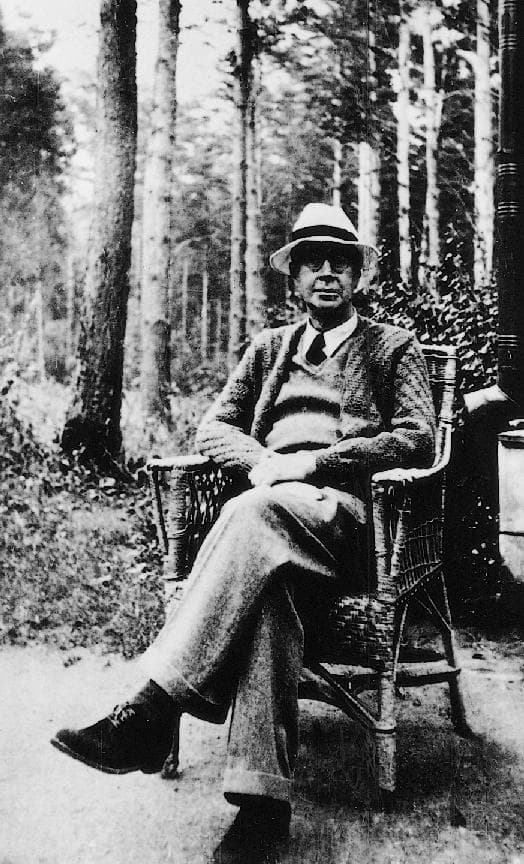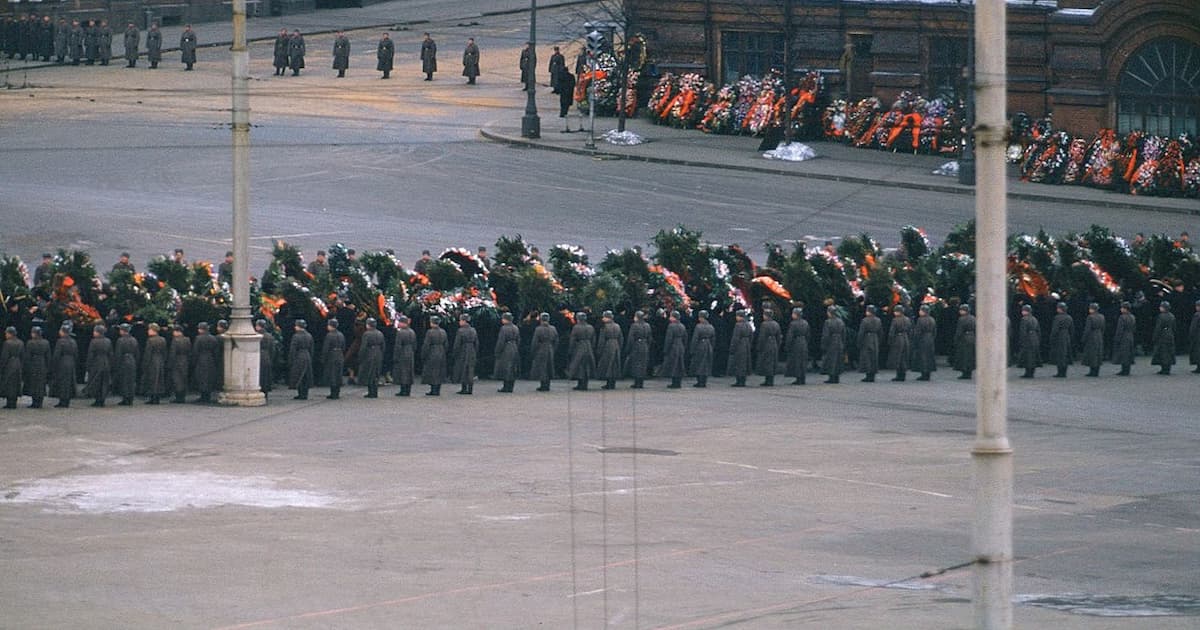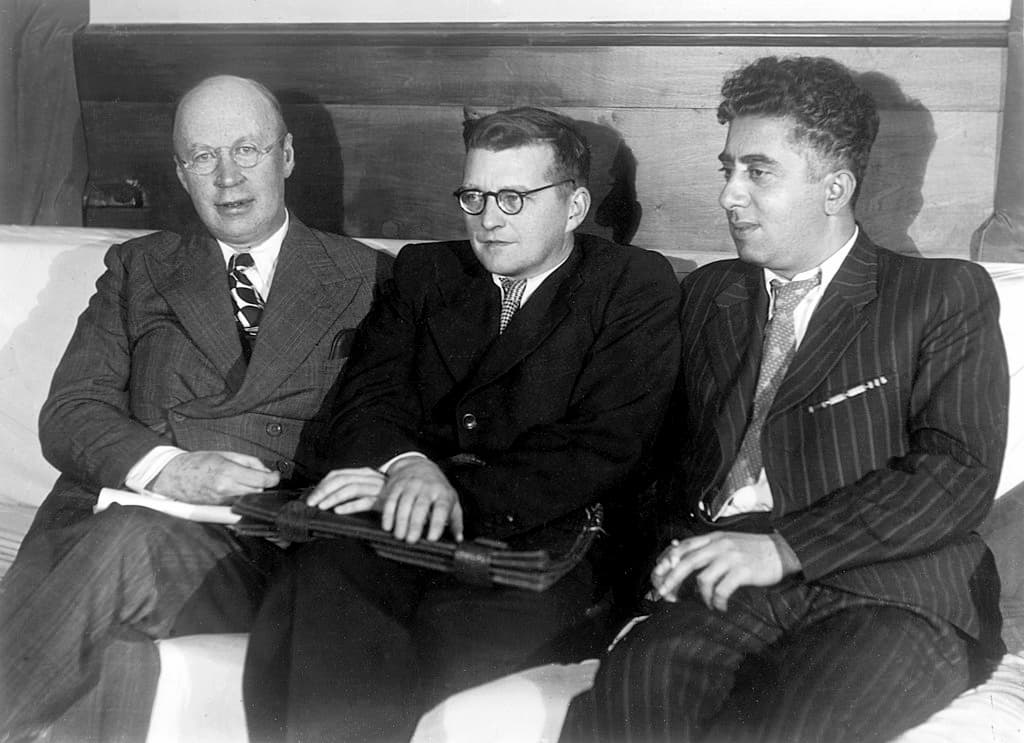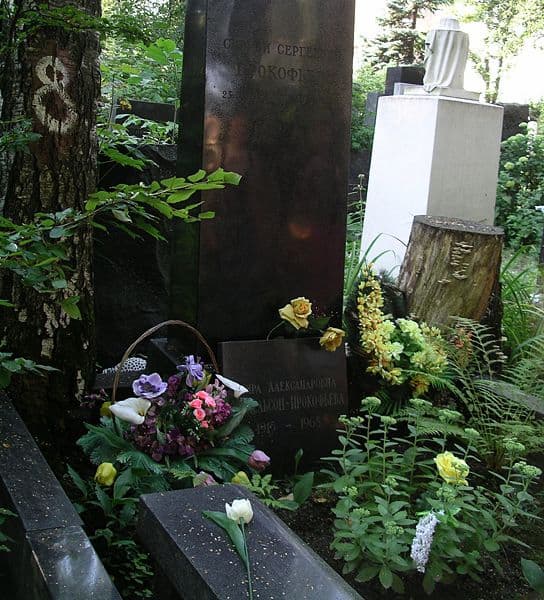Sergei Prokofiev’s death on 5 March 1953, only about one hour before the passing of Joseph Stalin, went almost unnoticed in the press. In fact, his death went unreported for some days. Sovetskaya Muzyka finally carried his obituary in the April 1953 issue on page 117, with all previous pages devoted to praising Stalin. When news of Prokofiev’s death reached the corridors of the Bolshoi theatre, the reaction was one of indignation. “Who had died? Another person besides Stalin could not have dared to die. Stalin alone had died, and all the people’s feelings, all the grief of loss, should belong to him alone.”
Who Attended Prokofiev’s Memorial Service?

Sergei Prokofiev, 1951
Apparently, the crowds in Red Square mourning Stalin were rather thick and all roads blocked off. As such, Prokofiev’s body could not be moved immediately. It took great efforts and several days to move his coffin from his apartment across from the Moscow Art Theatre “to a tiny room in a basement of the composer’s house on Myausskaya Street for a civil funeral.” While millions of Soviet citizens paid their last respects to one of the most notorious mass murderers of all time, only a handful of individuals, including Kabalevsky, Shostakovich, and Khachaturian, were present at Prokofiev’s memorial service on 7 March.
Sergei Prokofiev: Romeo and Juliet (Final Scene)
Since all musicians were ordered to perform at Stalin’s funeral, the “family was reduced to playing a recording of the funeral march from his ballet Romeo and Juliet.” Adding further insult, every florist in Moscow was ordered to provide every last flower to Stalin’s funeral, and Prokofiev’s family supposedly had to decorate the casket with paper flowers.
The Composer’s Painful Last Years

Stalin’s funeral procession
Prokofiev died at the age of 61, apparently “of an intracerebral brain hemorrhage.” For over eight years before his death, he had suffered from episodic headaches, nausea, and dizziness and had been admitted to the hospital on multiple occasions. Sviatoslav Richter twice visited the composer in his Kremlin Hospital ward and reports, “He was alone, and somehow completely grown soft. The tone of his voice was extremely offended. He said, ‘they don’t let me write…the doctors won’t allow me to write…’ He complained that they kept taking his paper away, but that he wrote and hid a small paper napkin under his pillow.”
Sergei Prokofiev: Winter bonfire, Op. 122 “Waltz on the Ice” (Hallé Orchestra; Stephen Bell, cond.)

Prokofiev, Shostakovich and Khachaturian
Prokofiev’s serious health problems date back to the late 1940s, and the life-threatening crisis he experienced in January 1945. Only a few days after the triumphant premiere of his 5th Symphony, Prokofiev took a fall and struck his head. Suffering from a severe concussion, he was rushed unconscious to the local hospital, and his blood pressure elevated dangerously. For several months he seemed barely able to hold on and Kabalevsky remembers, “Prokofiev lay absolutely motionless. From time to time he ceased to recognize those around him and lost consciousness… It seemed this was the end.” Prokofiev eventually recovered somewhat, but his health kept deteriorating and recurrent headaches and critically high blood pressure plagued him for the rest of his life. An early biographer wrote, “The illness which overshadowed the last years of his life did not lessen his capacity for work; on the contrary, because of it all his physical and mental energies were concentrated on his art. This is one of the reasons why his autobiography, which he very much wanted to write, remained unfinished.”
Sergei Prokofiev: Piano Sonata No. 9, Op. 103
A Day Spent Without Work Is a Day Wasted

Grave of Prokofiev
Prokofiev considered “a day spent without work as a day wasted,” and during his final years, he was frequently upset when his doctors told him to stop working. Prokofiev complained bitterly, “I am only vegetating.” With his remarkable singleness of purpose, he could work under any circumstances, all he needed was a piano and a desk. “But he composed music even when there was neither piano nor desk, in trains, in ship cabins, and in hospital wards. He worked in all moods, in moments of spiritual elation and at times when he felt weary and depressed; when he felt so energetic and vigorous that even his doctors would be satisfied.” After 1948, Prokofiev’s health steadily declined and he was constantly under attack for alleged artistic errors detailed in the Zhdanov resolution. On 16 February 1948, Prokofiev wrote a long letter to the Union of Composers explaining that his state of health did not allow him to personally attend their meeting. “Under the influence of western currents,” Prokofiev writes, “I am guilty of formalism and atonality…which has led to the impoverishment and decline of music, one that is foreign to the Soviet people.” As a scholar writes, “Here we see a great artist forced by an unspoken but only too comprehensible threat to ape the language of narrow-minded cultural bureaucrats, deny his own talent, and abase himself.” Prokofiev was unceremoniously laid to rest at Novodevichy Cemetery in Moscow.
For more of the best in classical music, sign up to our E-Newsletter
Sergei Prokofiev: Sinfonia Concertante, Op. 125 (Bach encore)
